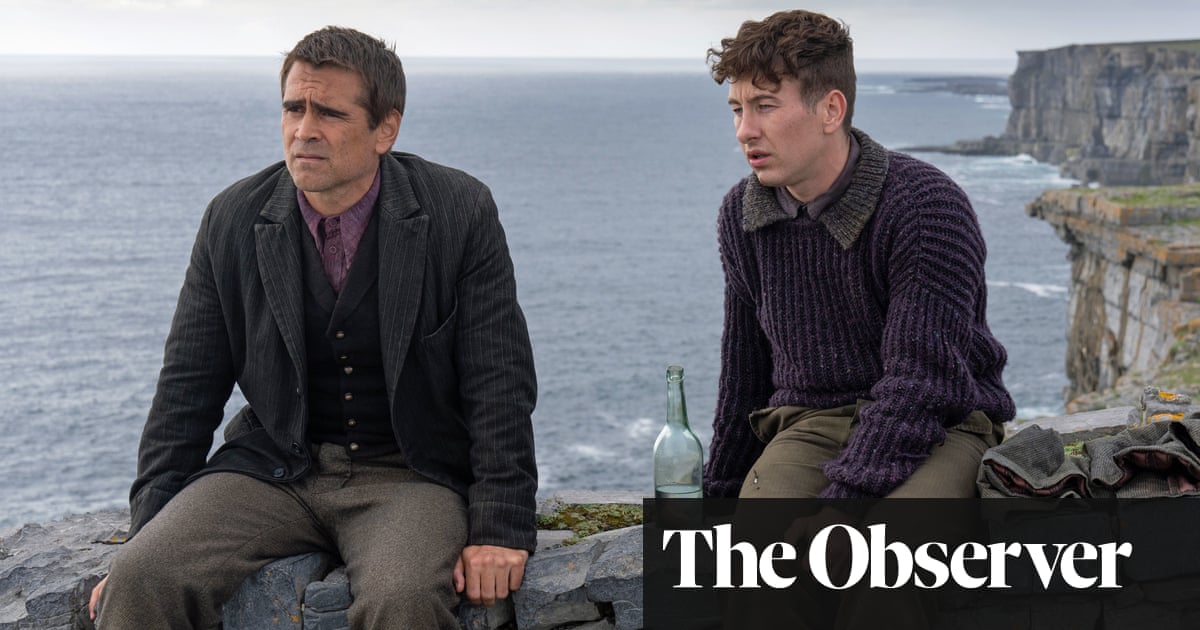
At Sunday night’s Oscars, The Banshees of Inisherin is up for nine awards. However, some feel it should be 10.
The fisherman knits worn by Pádraic (Colin Farrell) and Colm (Brendan Gleeson) throughout the film have gained something of a cult following, leading some to question … where is the best jumper award?
Knitwear shops in Ireland have reported a spike in sales of traditional jumpers following the release of the film. On TikTok, there are videos of Gen Z scouring secondhand shops to find similar woollies, while the online networking site Reddit has a forum dedicated to working out the patterns so that users can knit their own.
The film is set in 1923 on a fictional Irish island, and costume designer Eimer Ní Mhaoldomhnaigh says both she and the director Martin McDonagh wanted to avoid anything that could be seen as an Irish cliche.
Ní Mhaoldomhnaigh, whose filmography spans Irish period pieces including Ken Loach’s The Wind That Shakes the Barley, was already familiar with the clothing of the time but embarked on reconnaissance of the two islands where the film was shot, Achill off the county Mayo coast, and Inis Mór, the largest of the Aran Islands on the edge of Galway Bay.
Traditionally, due to limited resources, islanders dressed similarly. Wool came from their own sheep, which they weaved themselves, while patterns for things such as trousers were shared. Ní Mhaoldomhnaigh and McDonagh were keen to veer away from this type of “uniform dressing”. While the shapes and silhouettes used are accurate, the historical codes were loosely interpreted to reflect “the island that existed in McDonagh’s head”.
It was also the reason Ní Mhaoldomhnaigh rejected Aran jumpers, patterns of which can be traced back to the 1890s. “They are now in fashion. I felt they were expected. I was worried they could come across as almost comical.”
To avoid further pastiche, Ní Mhaoldomhnaigh focused on one image from the time that featured a group of fishermen wearing knitwear with more simple detailing such as three rows of cabling. It fell to a friend, 83-year-old Delia Barry, to replicate the patterns. “I showed her the photos and asked if she could do something similar.”
A week later, Ní Mhaoldomhnaigh had her first jumper. Barry, who has been knitting for more than 70 years, knitted all the jumpers in pieces on two straight needles before stitching them together.
The drop collar on Pádraic’s red jumper proved the most challenging. It featured moss diamond and purl stitches, and she had to knit the jumper twice, after it was decided it worked better in a darker shade of red. “Colours nowadays are quite bright so we dipped everything to tone it down,” says Ní Mhaoldomhnaigh.
The jumpers’ colouring was key to the hyperrealism of the film. Ní Mhaoldomhnaigh had to balance the vivid green and blue landscape with more muted locations such as the candlelit pub. It was why she was keen to use Irish textiles which look “slubby on screen” rather than flat.
The wool for the jumpers came from Donegal, the yellow coat worn by Colm’s sister Siobhán (Kerry Condon) was made at John England Linen in Down, while the two-tone red and black cloak Mrs McCormick wears was woven at Emblem Weavers in Wexford.
McDonagh was keen for the aesthetic to reference classic American westerns as Pádraic and Colm’s small-scale drama plays out against the vast and wild landscape. This played into the pointed collars and Colm’s long billowing coat, which also nods to the scholars who travelled the country recording Irish texts.
Ní Mhaoldomhnaigh aged the pieces by sanding and tying them up to reflect the islanders’ lifestyle. “They were fishermen, farmers and turf cutters, wiry and athletic people,” she says. “It was hard work. Clothes were built to last but they still had beautiful detailing.”
The jumpers are safely preserved as part of the Irish Costume Archive Project, which Ní Mhaoldomhnaigh runs with fellow costume designer Veerle Dehaene. Astute fans, however, may spot Gleeson in a familiar-looking blue jumper. After filming, he commissioned Barry to knit another.












